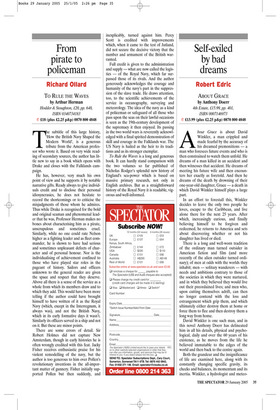From pirate to policeman
Richard Ollard
TO RULE THE WAVES by Arthur Herman Hodder & Stoughton, £20, pp. 648, ISBN 0340734183 V £18 (plus £2.25 p&p) 0870 800 4848 The subtitle of this large history, ‘How the British Navy Shaped the Modern World’, is a generous tribute from the American professor who wrote it. Based on very wide reading of secondary sources, the author has little new to say in a book which opens with Drake and closes with the Falklands campaign.
He has, however, very much his own point of view and he supports it by notable narrative gifts. Ready always to give individuals credit and to disclose their personal idiosyncrasies, he does not hesitate to record the shortcomings or to criticise the misjudgments of those whom he admires. Thus while Drake is recognised for the bold and original seaman and phenomenal leader that he was, Professor Herman makes no bones about characterising him as a pirate, unscrupulous and sometimes cruel. Similarly, while no one could rate Nelson higher as a fighting leader and as fleet commander, he is shown to have had serious and sometimes unpleasant defects of character and of personal honour. Nor is the individualising of achievement confined to those who have played star roles in the pageant of history. Sailors and officers unknown to the general reader are given the space and respect that they deserve. Above all there is a sense of the service as a whole from which its members draw and to which they add. This would have been more telling if the author could have brought himself to have written of it as the Royal Navy (which, except in the Interregnum, it always was), and not the British Navy, which in its early formative days it wasn’t. Similarly its officers served in a ship and not on it. But these are minor points.
There are some errors of detail. Sir Robert Holmes did not capture New Amsterdam, though in early histories he is often wrongly credited with this feat. Jacky Fisher receives enthusiastic praise for his violent remodelling of the navy, but the author is too generous to him over Pollen’s revolutionary inventions in the all-important matter of gunnery. Fisher initially supported Pollen but then suddenly, and inexplicably, turned against him. Percy Scott is credited with improvements which, when it came to the test of Jutland, did not secure the decisive victory that the number and armament of the British warranted.
Full credit is given to the administration and supply — what are now called the logistics — of the Royal Navy, which far surpassed those of its rivals. And the author generously acknowledges the courage and humanity of the navy’s part in the suppression of the slave trade. He draws attention, too, to the scientific achievements of the service in oceanography, surveying and meteorology. The idea of the navy as a kind of policeman or safeguard of all those who pass upon the seas on their lawful occasions is seen as the 19th-century development of the supremacy it then enjoyed. Its passing in the two world wars is reverently acknowledged with a final spirited demonstration of skill and courage in the Falklands war. The US Navy is hailed as the heir to its traditions and as its stronger exemplar.
To Rule the Waves is a long and generous book. It can hardly stand comparison with the two volumes so far published of Nicholas Rodger’s splendid new history of England’s sea-power which is based on massive primary research, not only in English archives. But as a straightforward history of the Royal Navy it is readable, vigorous and well-informed.















































 Previous page
Previous page